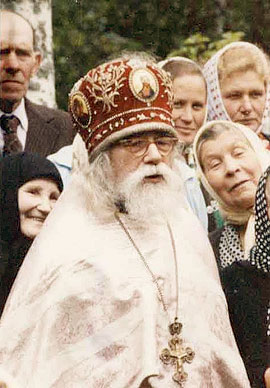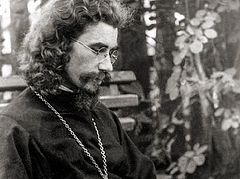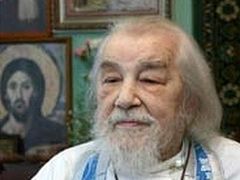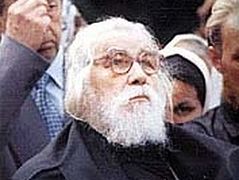 Archimandrite John (Krestiankin)
Archimandrite John (Krestiankin) This is what the great instructors of the Philokalia Sts. Callistos and Ignatius of Xanthopouli wrote about this matter: “Seek out with all fervency and try to find an undeceived guide who is spirit-bearing, and leads a life that corresponds to his words, who is humble in his own thoughts about himself, and of upstanding morals.”1
Just such an authentic pastor was Archimandrite John (Krestiankin) (1910–2006), who died on this day in 2006. Feeling this, people came to him from all corners of Russia and even from other countries, or to be more precise, God led those thirsting for spiritual advice to the one who could truly give it and help anyone.
Archimandrite John’s amazing life and fate was such that, one could say, he was himself a manifestation of undamaged succession of Holy Tradition in the Russian Orthodox Church, its unified teaching from prerevolutionary times to the present. He began his service in the Church during Tsarist times—by the age of six, that is, in 1916, he became an acolyte at the Church of the Prophet Elias on the Sand in the city of Orel. In his youth he helped the holy Hieromartyr Seraphim (Ostroumov) at services. In 1923 he met Patriarch Tikhon in Donskoy Monastery and received his blessing. At the end of World War II he became one of the laymen who filled the gaps in the ranks of priests greatly thinned under the persecutions. Having known many confessors of the faith and martyrs, Fr. John was also worthy of a confessor’s crown; from 1950 to 1955 he was in prison for his faith. In 1966 he received the monastic tonsure and became a member of the Pskov-Caves Monastery—the only monastery in the Russian Church that was never closed during soviet times. Later, he actively took part in the work of restoring Church life after the fall of the godless regime, rendering spiritual help to a multitude of monks, priests, and laypeople. The elder made statements about painful questions that were disturbing the minds of many Orthodox Christians—such was his famous statement in 2001 concerning the new social identification numbers.2 He died on February 5, 2006, having finished his nearly 90 years of service to Christ’s Church.
As the brothers of the Pskov-Caves Monastery say, “We understand that we lived with a living saint, who was at the same time very accessible, simple, loving, and humble. Batiushka always encouraged and consoled us. All of batiushka’s deeds matched his words… He was absolutely alive, active, always exultant and Paschal!3
Many testify that Fr. John possessed obvious divine gifts, and was clairvoyant. For example, Archimandrite Athanasius (Kultinov), who served with batiushka during the soviet years, related, “[One day] attacks began against me, other thoughts: ‘You won’t be saved… You’ll perish…’ and the like. He came up to me and said, ‘You’ll be saved, and your family will be saved too!’ He directly answered my thoughts.”4 Many similar stories are known, as are also testimonies to miraculous healings by the elder’s prayers and other signs.
But nevertheless, the majority of those who went to him in Pechory did not go for the miracles.
Those people who were fortunate enough to associate with Fr. John say that even his very presence banished despondency and anguish from the souls who came to him, and brought joy, new strength, and enthusiasm. Those who were able to be near him felt that their inner state was changed and transformed. All different people testify to this, without knowing each other—which means that there is something greater than personal emotion behind their words. They felt good around Fr. John precisely because Fr. John was with Christ, and this gave him the strength to live according to the apostolic commandments: Ever rejoice in the Lord (Phillip. 4:4).
Many noted an amazing tact in his manner of dealing with people. There wasn’t a shadow of that authoritarianism and intoxication with others’ attention that is characteristic of many of those who try to play the elder without being one in fact. Fr. John never dictated and never forced anyone to obey his spiritual advice, because he did not want to force his own will on those who came to him, but rather to teach them to seek out God’s will, and this is impossible without trust in God as the omniscient, omnipotent, and good Provider.
Pointing to this truth, Fr. John reminded people, “My dear ones, God’s Providence rules the world, and not we sinful people… There are no forgotten ones in God, and God’s Providence sees everyone. And God rules the world, only God and no one else… My dears, children of God, believe in God and trust Him! Bring everything in life—both joy and gloom, prosperity and evil days—as the mercy and truth of the Lord’s ways. And fear nothing in life but sin.”5 “There are no accidents in life and cannot be; God the Provider rules the world, and every circumstance has its higher spiritual meaning, and is granted by God for the fulfillment of this eternal goal—to come to the knowledge of God.”6
The above-mentioned problem of seeking and finding a spiritual instructor is in many ways bound up with the fact that sometimes even church-going people do not always clearly and correctly understand who a spiritual father should be and what their relationship with him should be.
The practice spread of considering as one’s spiritual father any simple priest to whom one goes regularly to confession and who may not remember your name, or if he does remember it, discusses things with you in no more than a few phrases during the general confession. Warning people about making a hasty choice, Archimandrite John would say, “Do not rush to call one person your spiritual father.”7
Fr. John called spiritual fatherhood one of the treasures given by the Lord to the Church, in which the Church will not be lacking even to the end of time. “The purpose of spiritual fatherhood is to grow and cultivate that seed of life given to a person’s soul by the Lord, to guard it on the unknown paths of spiritual life, to be a guide, to make peace between the person and God through the grace-filled power of the Sacraments. Spiritual fatherhood is fatherhood when in the torments of birth the spiritual father frees one from the webs of sin and from the lack of knowledge in a person of that image of God given to him, and show him the path to the likeness of God.8
A spiritual instructor is a person who has had experience in passing through the path of spiritual life and can as a guide lead his spiritual child along it. The principles according to which one can discern such a person are indicated, as we recall, in the words cited above from Sts. Callistos and Ignatius of Xanthopouli and were manifested in Fr. John’s very life. It is not always easy to find a priest who would completely correspond to these principles, and this reminds us of that truth that finding a spiritual instructor is not the “natural right of every believer”, but a gift of God that one has to pray hard for. Therefore Fr. John advised in his letters to “Continue to pray that you be granted a spiritual father.”9
Archimandrite John saw one of the widespread and dangerous mistakes in relation to a spiritual father to be the longing to transfer the weight of all our life decisions onto him. We often see warnings about this in his letters.
“A spiritual father cannot live your life for you, this never has been and never will be… Does a natural father live his child’s life for him? So also the spiritual father is only your helper, counselor, and prays on your behalf, giving blessings for decisions you have already thought through.10
“I receive your letter, but I will not resolve your family problems, because you should decide them with your spouse. And even a spiritual father is called to bless the decisions you yourself have thought through, and not willfully dictate one or another step to his spiritual children… Think hard about the personal example in your relationship with your spiritual father. Draw conclusions. For the fracture in your relationship is occurring because you are trying to force your spiritual father to live and think for you. And at your demands, he is taken upon himself to do what he should not do. And the Lord puts to shame both your hopes and his efforts. And the result is—you yourself know what it is.”11
Another just as widespread mistake in a relationship with a spiritual father is lack of trust in him, which makes it impossible for the person to receive any benefit from having a spiritual father, for “the spiritual child’s protection [in spiritual warfare] lies in his trust of his spiritual father and in the awareness of his own sinfulness and his mistrust of his own self.”12 Above Fr. John compares the spiritual father with a guide, that is, a conductor along those paths that the person himself doesn’t know. As the one being led trusts the conductor (if he says “go there” that means go there; if he says “spend the night here” that means, here; he says, “don’t drink this water,” it means, don’t drink it), so also a spiritual child should completely trust his spiritual father. If a traveler stops trusting his leader and starts doing his own will, not listening to the leader’s instructions, he will go off the track, and finally risks getting completely lost and perishing. Fr. John warns against such mistrust and self will in his letters.
“That is not what to do—asking advice and blessings from any spiritual father who comes along… God’s blessing has determined that your spiritual father be Father Z. So do not willfully seek other counselors! Otherwise there will be temptations and you’ll get a divorce. There is one goal, but many paths to it. Your spiritual father will give you everything needed for your soul.”13
“Forgive me magnanimously, but I do not see the need to insert my advice between you and your spiritual father. Benefit does not come form counsel with many, but in much counsel with one. The Lord gave you a spiritual father—bow your will to him, and accept his counsel without judgment. And if he is silent in answer to a question, then be patient and wait—the answer will come through the prayers of the spiritual father.”14
In his instructions Fr. John was able to point out the more essential temptations that an Orthodox Christian faces today.
He spoke very much about the egotistical “playing spiritual life”, which comes from the lack of desire to lead a truly spiritual life, uninterruptedly connected work on ourselves and self denial. Fr. John spoke of those “self-made crosses”, when a person rejects the path to his salvation that the Lord has given him—he doesn’t want to carry the cross of the breadwinner of a large family or take care of his sick parents, but instead in his prideful subtlety contrives a special “spiritual” life for himself.15
To one family that wanted to sell their apartment in the city and buy a house near a monastery he wrote, “You have only just begun to enter the path of a Christian understanding of life, so do not veer off into selfishness and egoism at the very start. And also: Do not forget that we ourselves, in following after the best goals, cannot do anything good on our own. And nowadays it is impossible to hide from mankind anywhere, except in your heart, by setting up an altar to the living God. This is the goal. Forget your thoughts of Solovki entirely. You are family people, and you are living a new life, blessed for you by the Lord. Do not proudly think to bring elements of monastic labor into your life.”16
The elder spoke specifically about many other temptations of today. Priest Alexander Tikhonov related that at a question about ecumenism Fr. John replied, “No no! May the Lord preserve and save!”17 Archimandrite [now bishop] Tikhon (Shevkunov) testified that in relation to those who are now often called modernists and who are sometimes compared to the renovationists, Fr. John said, “If we do not destroy their movement, they will destroy the Church.”18 To one priest’s wife who was attracted to sectarianism and their seeming righteousness Fr. John wrote, “As for sectarians, don’t be fooled. It’s all beautiful except as regards the salvation of the soul; and is it really all so beautiful?”19
Yet another destructive temptation for many Orthodox is mistrust of the Church, about which Fr. John wrote: “Now many are only beginning to enter the Church, but they begin 'saving themselves' not by correcting themselves but by criticizing the Church. Know, that without the Church there is no salvation, and its rudder is the Lord Himself. And He knows better how and through whom it should be led through the stormy sea of life. So be in the Russian Orthodox Church, headed by a canonical patriarch, and save yourself, if you will live by laboring in the fulfillment of God’s commandments.
“Whoever continues to look for something else after having found the truth is looking for a lie. You are in the Orthodox Church, which is the pillar and confirmation of truth, and the treasuries of which are preserved and taught through the lips of God’s priests… This is our weapon [against temptations]—love for God and the Church.”20
Truly, in recent years the devil has sown tares among many Orthodox of suspicion and mistrust for the Church hierarchy—the successors of the apostles—and the growth of these tares has led to schism, when a person finds one or another excuse and leaves the Church. Many infected with a spirit of mistrust for the Church and striving to war and propagate their own views came to Archimandrite John, thinking to find in him an authoritative confirmation of their intentions. But they heard in reply:
“The state problem of individual tax numbers are through the efforts of God’s enemy, false rumors about the three sixes being entered into the tax number have found in the spiritual world the great power of confusion and has become for us that test, which has brought out in the faithful an absence of faith in God and truth in the Mother-Church!.. Fear divisions and schism in the Church! Fear falling away from the Mother-Church—She alone restrains the lava of antichristian outrage in the world now! Fear judging the Church’s hierarchy, for this will be destruction even without the seal of antichrist!”21
To one hieromonk who invited him to participate in the movement “For life without TIN” [Tax Identification Number], the elder wrote: “I will not participate in the campaign your are proposing. The very spirit of such activity, with its abundant selfishness, noise, and hope in man rather than in God, yes, and especially with its criticism of the Church hierarchy, which springs out like a fountain in your words, forbids me to do so. I have already seen such things in the activities of the renovationists, who rose up against the most gentle Patriarch Tikhon, in fact against the Lord Himself and His Church.”22
About how Fr. John related to the separation of a priest from his bishop can be seen from the following two stories.
Oleg Tikhomirov relates, “My spiritual father calls me and says, ‘I have changed to the Catacomb church.’ I was stunned by his courage. But only later did I think, ‘Why leave? Now anything is allowable!’” Oleg set off for the Pskov-Caves Monastery for advice from Fr. John, and here is what happened: “Batiushka called me ‘little dove’, patted me on the head, and was affectionate. He seated me on the sofa, sprinkled me with holy water, and anointed my forehead with holy oil. Then he said, ‘Tell Fr. N. just one thing: Let him remember the oath he gave at his ordinations into the diaconate and priesthood.’ And to me he said, ‘Hold to our patriarch, and don’t take one step away from him.”23
Vera Strievskaya relates a similar case, when a priest she knew changed to the Russian Church Abroad (before its reunification with the Russian Orthodox Church). Elder John then said the following:
“You know Fr. A. as a person. And he is not unknown to me. There can be no pretenses on that account. But even in the Psalter there is a little prayer where a person asks for mercy and forgiveness, and says: Although I have sinned much, I have not departed from faith in Christ and the Orthodox Church. But Fr. A., if he goes out from under the omophorion of the bishop who ordained him—and he has already gone out—he will be deprived of grace and become graceless. This is in fact a betrayal of God and the Church. It is as if, for example, I was with Vera. I didn’t like her anymore and left for Maria. I got tired of this Maria and took another Maria.
“When I served in the parish, I had to perform many weddings. I would give the groom and bride a certain promise to read. Let’s say, I, Vera, agree to enter into marriage with John. I promise to be a faithful spouse and to love him, be with him until death. And the groom says: I John, agree to enter into marriage with Vera and promise to be faithful to her until death.
“When a priest is ordained, he gives a similar oath of faithfulness to the faith and hierarch of the Church. So here we have a serious sin—oathbreaking… How many divisions there have already been… These are, after all, wounds for the Church.”24
Fr. John considered the antidote for all modern errors to be sincere trust in God and love for His Church: “Not in one, however seemingly worthily living person, nor in a group of persons united in thought, nor in dreams, nor in visions, but in the Church—the voice of the Church—do we have faith. The Church cannot go underground; for then it will cease to be for the people what it should be… The Church, according to the Savior’s promise, will live and perform its great and saving service till the final days of the world, and therefore the voice of the Church through its canonical, lawful hierarchy is for us the voice of God.”25
(Footnotes cited from Russian texts.)




